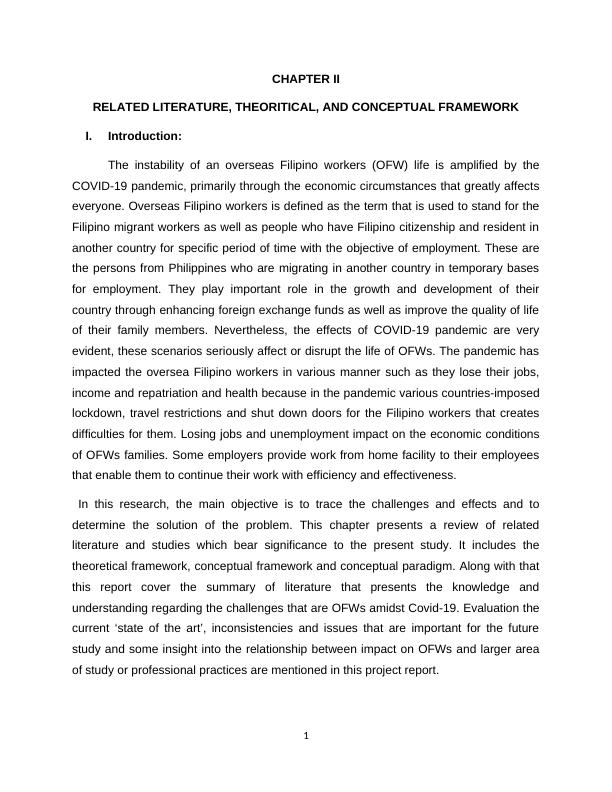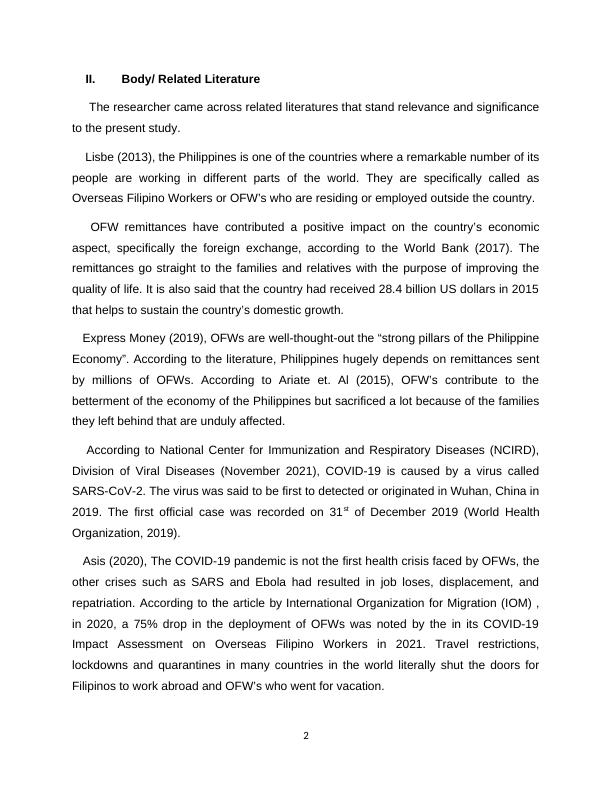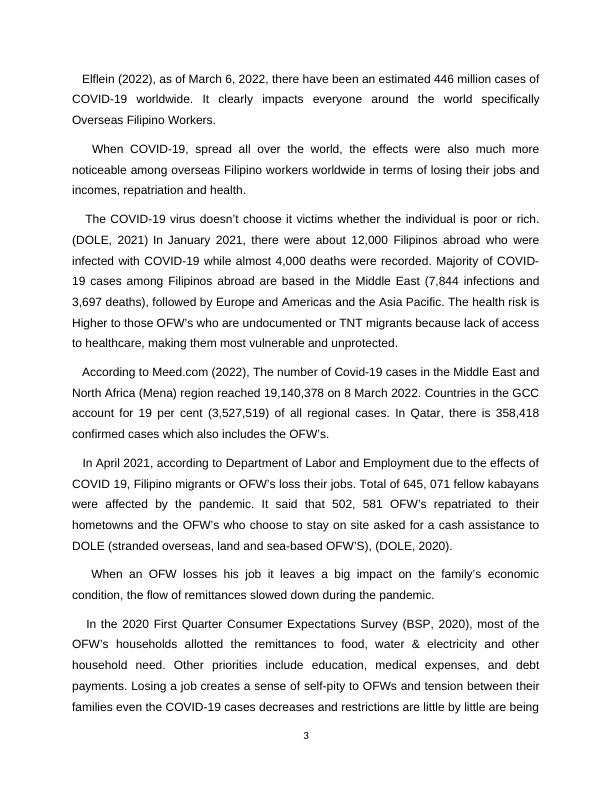Challenges Faced by OFWs Amidst COVID-19: A Review of Related Literature
Added on 2023-06-12
8 Pages2880 Words220 Views
CHAPTER II
RELATED LITERATURE, THEORITICAL, AND CONCEPTUAL FRAMEWORK
I. Introduction:
The instability of an overseas Filipino workers (OFW) life is amplified by the
COVID-19 pandemic, primarily through the economic circumstances that greatly affects
everyone. Overseas Filipino workers is defined as the term that is used to stand for the
Filipino migrant workers as well as people who have Filipino citizenship and resident in
another country for specific period of time with the objective of employment. These are
the persons from Philippines who are migrating in another country in temporary bases
for employment. They play important role in the growth and development of their
country through enhancing foreign exchange funds as well as improve the quality of life
of their family members. Nevertheless, the effects of COVID-19 pandemic are very
evident, these scenarios seriously affect or disrupt the life of OFWs. The pandemic has
impacted the oversea Filipino workers in various manner such as they lose their jobs,
income and repatriation and health because in the pandemic various countries-imposed
lockdown, travel restrictions and shut down doors for the Filipino workers that creates
difficulties for them. Losing jobs and unemployment impact on the economic conditions
of OFWs families. Some employers provide work from home facility to their employees
that enable them to continue their work with efficiency and effectiveness.
In this research, the main objective is to trace the challenges and effects and to
determine the solution of the problem. This chapter presents a review of related
literature and studies which bear significance to the present study. It includes the
theoretical framework, conceptual framework and conceptual paradigm. Along with that
this report cover the summary of literature that presents the knowledge and
understanding regarding the challenges that are OFWs amidst Covid-19. Evaluation the
current ‘state of the art’, inconsistencies and issues that are important for the future
study and some insight into the relationship between impact on OFWs and larger area
of study or professional practices are mentioned in this project report.
1
RELATED LITERATURE, THEORITICAL, AND CONCEPTUAL FRAMEWORK
I. Introduction:
The instability of an overseas Filipino workers (OFW) life is amplified by the
COVID-19 pandemic, primarily through the economic circumstances that greatly affects
everyone. Overseas Filipino workers is defined as the term that is used to stand for the
Filipino migrant workers as well as people who have Filipino citizenship and resident in
another country for specific period of time with the objective of employment. These are
the persons from Philippines who are migrating in another country in temporary bases
for employment. They play important role in the growth and development of their
country through enhancing foreign exchange funds as well as improve the quality of life
of their family members. Nevertheless, the effects of COVID-19 pandemic are very
evident, these scenarios seriously affect or disrupt the life of OFWs. The pandemic has
impacted the oversea Filipino workers in various manner such as they lose their jobs,
income and repatriation and health because in the pandemic various countries-imposed
lockdown, travel restrictions and shut down doors for the Filipino workers that creates
difficulties for them. Losing jobs and unemployment impact on the economic conditions
of OFWs families. Some employers provide work from home facility to their employees
that enable them to continue their work with efficiency and effectiveness.
In this research, the main objective is to trace the challenges and effects and to
determine the solution of the problem. This chapter presents a review of related
literature and studies which bear significance to the present study. It includes the
theoretical framework, conceptual framework and conceptual paradigm. Along with that
this report cover the summary of literature that presents the knowledge and
understanding regarding the challenges that are OFWs amidst Covid-19. Evaluation the
current ‘state of the art’, inconsistencies and issues that are important for the future
study and some insight into the relationship between impact on OFWs and larger area
of study or professional practices are mentioned in this project report.
1

II. Body/ Related Literature
The researcher came across related literatures that stand relevance and significance
to the present study.
Lisbe (2013), the Philippines is one of the countries where a remarkable number of its
people are working in different parts of the world. They are specifically called as
Overseas Filipino Workers or OFW’s who are residing or employed outside the country.
OFW remittances have contributed a positive impact on the country’s economic
aspect, specifically the foreign exchange, according to the World Bank (2017). The
remittances go straight to the families and relatives with the purpose of improving the
quality of life. It is also said that the country had received 28.4 billion US dollars in 2015
that helps to sustain the country’s domestic growth.
Express Money (2019), OFWs are well-thought-out the “strong pillars of the Philippine
Economy”. According to the literature, Philippines hugely depends on remittances sent
by millions of OFWs. According to Ariate et. Al (2015), OFW’s contribute to the
betterment of the economy of the Philippines but sacrificed a lot because of the families
they left behind that are unduly affected.
According to National Center for Immunization and Respiratory Diseases (NCIRD),
Division of Viral Diseases (November 2021), COVID-19 is caused by a virus called
SARS-CoV-2. The virus was said to be first to detected or originated in Wuhan, China in
2019. The first official case was recorded on 31st of December 2019 (World Health
Organization, 2019).
Asis (2020), The COVID-19 pandemic is not the first health crisis faced by OFWs, the
other crises such as SARS and Ebola had resulted in job loses, displacement, and
repatriation. According to the article by International Organization for Migration (IOM) ,
in 2020, a 75% drop in the deployment of OFWs was noted by the in its COVID-19
Impact Assessment on Overseas Filipino Workers in 2021. Travel restrictions,
lockdowns and quarantines in many countries in the world literally shut the doors for
Filipinos to work abroad and OFW’s who went for vacation.
2
The researcher came across related literatures that stand relevance and significance
to the present study.
Lisbe (2013), the Philippines is one of the countries where a remarkable number of its
people are working in different parts of the world. They are specifically called as
Overseas Filipino Workers or OFW’s who are residing or employed outside the country.
OFW remittances have contributed a positive impact on the country’s economic
aspect, specifically the foreign exchange, according to the World Bank (2017). The
remittances go straight to the families and relatives with the purpose of improving the
quality of life. It is also said that the country had received 28.4 billion US dollars in 2015
that helps to sustain the country’s domestic growth.
Express Money (2019), OFWs are well-thought-out the “strong pillars of the Philippine
Economy”. According to the literature, Philippines hugely depends on remittances sent
by millions of OFWs. According to Ariate et. Al (2015), OFW’s contribute to the
betterment of the economy of the Philippines but sacrificed a lot because of the families
they left behind that are unduly affected.
According to National Center for Immunization and Respiratory Diseases (NCIRD),
Division of Viral Diseases (November 2021), COVID-19 is caused by a virus called
SARS-CoV-2. The virus was said to be first to detected or originated in Wuhan, China in
2019. The first official case was recorded on 31st of December 2019 (World Health
Organization, 2019).
Asis (2020), The COVID-19 pandemic is not the first health crisis faced by OFWs, the
other crises such as SARS and Ebola had resulted in job loses, displacement, and
repatriation. According to the article by International Organization for Migration (IOM) ,
in 2020, a 75% drop in the deployment of OFWs was noted by the in its COVID-19
Impact Assessment on Overseas Filipino Workers in 2021. Travel restrictions,
lockdowns and quarantines in many countries in the world literally shut the doors for
Filipinos to work abroad and OFW’s who went for vacation.
2

Elflein (2022), as of March 6, 2022, there have been an estimated 446 million cases of
COVID-19 worldwide. It clearly impacts everyone around the world specifically
Overseas Filipino Workers.
When COVID-19, spread all over the world, the effects were also much more
noticeable among overseas Filipino workers worldwide in terms of losing their jobs and
incomes, repatriation and health.
The COVID-19 virus doesn’t choose it victims whether the individual is poor or rich.
(DOLE, 2021) In January 2021, there were about 12,000 Filipinos abroad who were
infected with COVID-19 while almost 4,000 deaths were recorded. Majority of COVID-
19 cases among Filipinos abroad are based in the Middle East (7,844 infections and
3,697 deaths), followed by Europe and Americas and the Asia Pacific. The health risk is
Higher to those OFW’s who are undocumented or TNT migrants because lack of access
to healthcare, making them most vulnerable and unprotected.
According to Meed.com (2022), The number of Covid-19 cases in the Middle East and
North Africa (Mena) region reached 19,140,378 on 8 March 2022. Countries in the GCC
account for 19 per cent (3,527,519) of all regional cases. In Qatar, there is 358,418
confirmed cases which also includes the OFW’s.
In April 2021, according to Department of Labor and Employment due to the effects of
COVID 19, Filipino migrants or OFW’s loss their jobs. Total of 645, 071 fellow kabayans
were affected by the pandemic. It said that 502, 581 OFW’s repatriated to their
hometowns and the OFW’s who choose to stay on site asked for a cash assistance to
DOLE (stranded overseas, land and sea-based OFW’S), (DOLE, 2020).
When an OFW losses his job it leaves a big impact on the family’s economic
condition, the flow of remittances slowed down during the pandemic.
In the 2020 First Quarter Consumer Expectations Survey (BSP, 2020), most of the
OFW’s households allotted the remittances to food, water & electricity and other
household need. Other priorities include education, medical expenses, and debt
payments. Losing a job creates a sense of self-pity to OFWs and tension between their
families even the COVID-19 cases decreases and restrictions are little by little are being
3
COVID-19 worldwide. It clearly impacts everyone around the world specifically
Overseas Filipino Workers.
When COVID-19, spread all over the world, the effects were also much more
noticeable among overseas Filipino workers worldwide in terms of losing their jobs and
incomes, repatriation and health.
The COVID-19 virus doesn’t choose it victims whether the individual is poor or rich.
(DOLE, 2021) In January 2021, there were about 12,000 Filipinos abroad who were
infected with COVID-19 while almost 4,000 deaths were recorded. Majority of COVID-
19 cases among Filipinos abroad are based in the Middle East (7,844 infections and
3,697 deaths), followed by Europe and Americas and the Asia Pacific. The health risk is
Higher to those OFW’s who are undocumented or TNT migrants because lack of access
to healthcare, making them most vulnerable and unprotected.
According to Meed.com (2022), The number of Covid-19 cases in the Middle East and
North Africa (Mena) region reached 19,140,378 on 8 March 2022. Countries in the GCC
account for 19 per cent (3,527,519) of all regional cases. In Qatar, there is 358,418
confirmed cases which also includes the OFW’s.
In April 2021, according to Department of Labor and Employment due to the effects of
COVID 19, Filipino migrants or OFW’s loss their jobs. Total of 645, 071 fellow kabayans
were affected by the pandemic. It said that 502, 581 OFW’s repatriated to their
hometowns and the OFW’s who choose to stay on site asked for a cash assistance to
DOLE (stranded overseas, land and sea-based OFW’S), (DOLE, 2020).
When an OFW losses his job it leaves a big impact on the family’s economic
condition, the flow of remittances slowed down during the pandemic.
In the 2020 First Quarter Consumer Expectations Survey (BSP, 2020), most of the
OFW’s households allotted the remittances to food, water & electricity and other
household need. Other priorities include education, medical expenses, and debt
payments. Losing a job creates a sense of self-pity to OFWs and tension between their
families even the COVID-19 cases decreases and restrictions are little by little are being
3

End of preview
Want to access all the pages? Upload your documents or become a member.
Related Documents
Challenges Faced by OFWs Amidst COVID-19lg...
|6
|2244
|323
Prevailing Paradigm of Society PDFlg...
|24
|4440
|41
